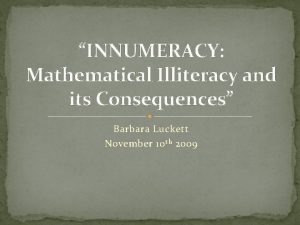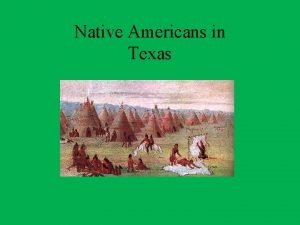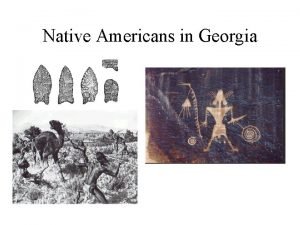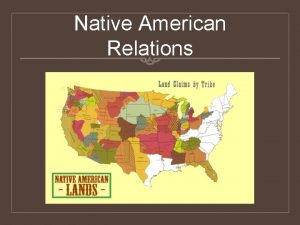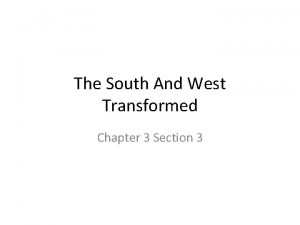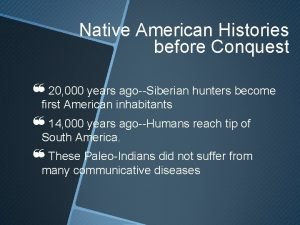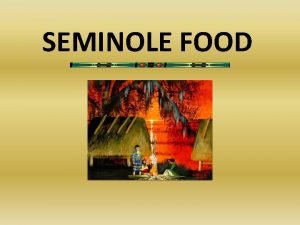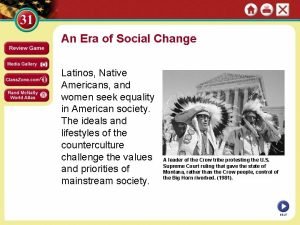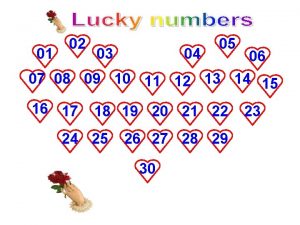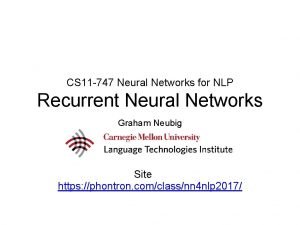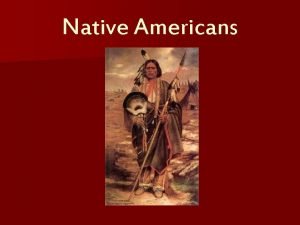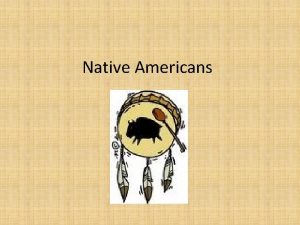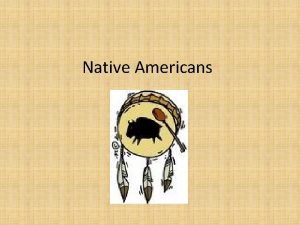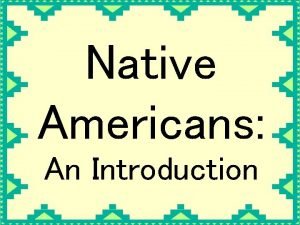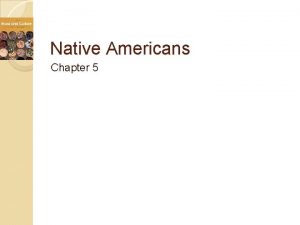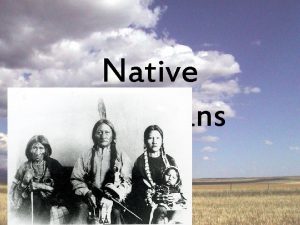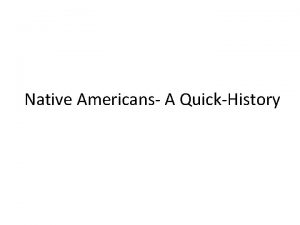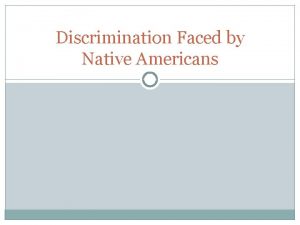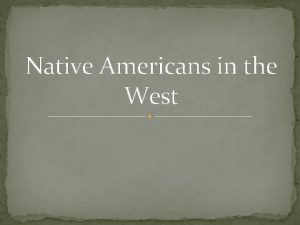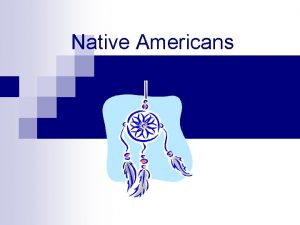Counseling Native Americans TRISSTAN LUCKETT CNS 747 PROJECT












- Slides: 12

Counseling Native Americans TRISSTAN LUCKETT CNS 747 PROJECT

Cultural Considerations for Counseling Native Americans Degree of Traditionalism Diversity within Native Americans Native American Model of Healing Drug Abuse among Native Americans

Degree of Traditionalism The extent to which a person is a Traditional Native American versus the degree of acculturation to U. S. society are major variables in Native American people (Thomason, 1991). It is beneficial to study the culture of a client, but it is important to remember that clients will differ in the degree to which they represent their culture.

Diversity Within Native Americans Differences within cultural groups tend to be greater than the differences between this group and other groups. There are four different types of Native American Households 1. Isolated Native American family 2. Traditional Native American family 3. Bicultural Native American family 4. Acculturated Native American family

Native American Model of Healing Traditional Native American healers do not specialize in physical as opposed to mental or emotional problems, since there is no such thing as a problem in only one of these areas, (Thomason, 1991). To Native Americans the term “mental health” essentially does not exist since it is not considered its own separate entity.

Substance Abuse among Native Americans Substance abuse is their number one health problem Alcohol-related deaths are 4. 8 times greater and the mortality rates for chronic liver disease and cirrhosis is 4. 5 times greater for Native Americans Between 75% and 80% of suicides involve alcohol (Garrett and Carroll, 2000).

Theoretical Considerations Solution-Focused Therapy Reality Therapy- Choice Theory Individual Psychology

Solution-Focused Therapy Given the client-identified solutions, egalitarian counselor/client relationship and the view that change is inevitable, Solution-focused therapy may be an appropriate theoretical orientation for Native Americans (Murdock, 2013, and Meyer and Cottone, 2013). Solution-focused therapy has been established as an applicable orientation for other diverse populations such as Asian, Latino, Hispanic, African American and white Americans, suggesting that Solution-focused therapy is “culturally sensitive and may prove applicable across other cultures” (Meyer and Cottone, 2013, p. 48).

Choice Theory- Reality Therapy The Rule of Six ◦ “The Rule of Six and the form of traditional Native American learning stories may also be used to help teach Choice Theory and to develop relationships with clients, helping them to gain better control of their lives by viewing their situation from alternate perspectives” (Mottern, 2003, p. 27). Glasser, as referenced by Murdock, (2013) said that Choice Theory is the basis for Reality Therapy. The most important aspect of the Choice Theory is that “we choose everything we do, including the misery we feel” (p. 464)

Individual Psychology Although Individual Psychology has not been proven through research to be helpful in treating Native American, there are many common themes that can be linked between Individual Psychology and the Medicine Wheel that can provide implications that Individual Psychology could be an applicable theoretical orientation for Native Americans.

References Garrett, M. T. , & Carroll, J. J. , (2000). Mending the broken circle: Treatment of substance dependence among native Americans. Journal of counseling & development, 78. 379 -388. Garrett, M. T. , Garrett, J. T. , Rivera, E. T. , Wilbur, M. , & Wilbur, J. R. , (2005). Laughing it up: Native American Humor as Spiritual Tradition. Journal of multicultural counseling and development, 33. 194 -205. Gladding, S. T. (2013). Counseling: A comprehensive profession, 7 th ed. Upper Saddle River, NJ. Horse, J. R. , (1997). Traditional American Indian family systems. Families, systems & health, (15)3. 243250. Meyer, D. D. , Cottone, R. R. , (2013). Solution-focused therapy as a culturally acknowledging approach with American Indians. Journal of multicultural counseling and development, 41. 47 -55. Mottern, R. , (2003). Using the rule of six and traditional American Indian learning stories to teach choice theory. International journal of reality therapy, (25)1. 27 -35. Murdock, N. L. (2013). Theories of counseling and psychotherapy: A case approach, 3 rd ed. Upper Saddle River, NJ.

References Roberts, R. L. , Harper, R. , Bull, D. T. , & Heideman, L. M. , (1998). The native American medicine wheel and individual psychology: Common themes. The journal of individual Psychology, 54(1). 135 -144. Thomason, T. C. , (1991). Counseling native americans: An introduction for nonnative American counselors. Journal of counseling & development, 69. 321327.
 Barbara luckett
Barbara luckett Where did native americans come from
Where did native americans come from Where did native americans come from
Where did native americans come from How many native americans died on the trail of tears
How many native americans died on the trail of tears What three circumstances hurt native american
What three circumstances hurt native american Portuguese sailor
Portuguese sailor What did seminoles eat
What did seminoles eat Latinos and native americans seek equality
Latinos and native americans seek equality Ms jones isn't as nice ms smith
Ms jones isn't as nice ms smith 11-747 neural networks for nlp
11-747 neural networks for nlp Oceanic airlines 777
Oceanic airlines 777 Newton law
Newton law 1553 bus vulnerabilities
1553 bus vulnerabilities
